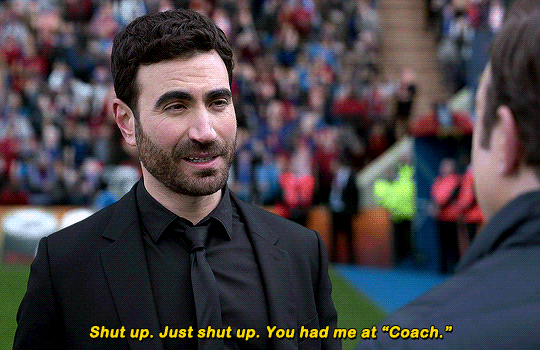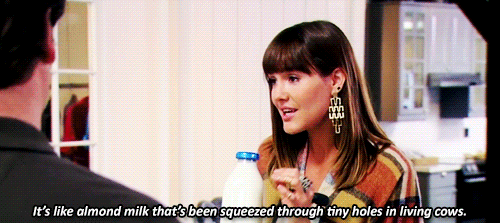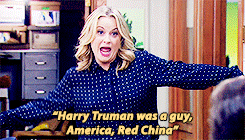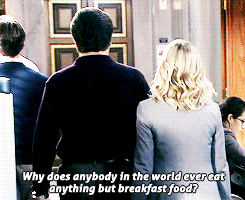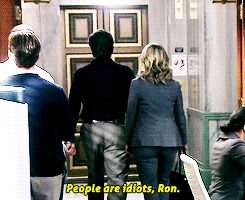"Gryzzlbox" & "Save J.J's"
Original Airdate: January 27, 2015
This week, Parks and Recreation delivered two incredibly solid episodes that I think might be up there on the list of the show’s best episodes ever. Both were so strong, relied heavily on the show’s wonderful ensemble, and were consistently funny throughout. And one featured the return of Treat Yo Self, so, yeah, overall, it was a pretty great night of television.
Sadly, Donna and Tom’s day of self-worship took place in the second episode, so we’ll have to wait to talk about it. But “Gryzzlbox” was just as fun and exciting, and a huge step forward for the Leslie vs. Gryzzl storyline that so far has anchored every episode this season. And when I say it was a huge step forward, I basically mean this episode brought it to its climax, that was then pretty much completely resolved in “Save JJ’s”. So, you know. Lots of things to talk about today.
"Gryzzlbox"
“Gryzzlbox” begins with Leslie and Ben reevaluating their case against Gryzzl. Leslie Knope, the eternal optimist, has finally given up. There’s nothing she can come up with to convince the Newports to donate their land instead of taking Gryzzl’s millions of dollars, and nothing she can do to convince Gryzzl to abandon their plans.
That is, until a Gryzzl drone (sorry, a “skypal”) arrives at her front door, carrying a present for her. It turns out other people have gotten them too, including Donna, whose box contained sugar plums and honeybears, which are the nicknames she and her fiancé use for each other – except they only use those nicknames on the phone or through text. There’s no way someone could have known that and chosen those specific items to give Donna. When Leslie opens her box and sees that it contains Joe Biden’s book (“Biden the Rails: 1001 Poems Inspired by My Travels Through Amtrak’s Northeast Corridor”. Honestly, I’m just glad to know that even in 2017, Leslie still loves Joe Biden as much as ever) and a poster of the Supreme Court in the style of a famous Friends poster, Ben realizes that Gryzzl is data mining – they’re taking people’s personal information that they share on their Gryzzl devices and using that to create profiles. But when Gryzzl installed their free wifi in Pawnee, Ben made sure to include protection against data mining in the contracts.
Ready as ever to take on a new challenge, Leslie holds a public forum to discuss how Gryzzl has broken the terms of their user agreement. But for once in her political career, Leslie faces zero opposition. Every single person who attends the forum agrees with her. I can’t tell if it’s a sign of how far things have come since the first season, or a sign of how bad this Gryzzl issue is. To show their solidarity, everyone starts chanting, “We’re not against you on this!” It’s nice, you guys. It’s really nice.
With the town and Donna on her side, Leslie goes to the person whose unwavering support she can count on: Ron Swanson. After all, this is the guy who threw his computer in the garbage when he learned about cookies and Google Earth. When they meet and Leslie eagerly shows him pictures of the triplets, Ron shows her a picture of his son, then immediately tears it up to protect John’s privacy. But, once they show him what Gryzzl’s doing, he’s not as eager to join their cause as they had hoped; laissez-faire as ever, Ron sees no reason to judge the practices of a privately-run business, and in fact, thinks it’s the user’s fault if they’re carrying a device that they trust with so much personal information. He even guesses, based on his time around Gryzzl’s lawyers, that it’s not actually illegal.
To get more information, Donna sets Ben and Leslie up with a tour of Gryzzl’s headquarters, led by the company’s VP, Roscoe Santangelo. Dressed in a hat, cardigan, beret, and glasses, Ben and Leslie (or Darlene Johannsson and her assistant-turned-lover Gregory Strong) go undercover to try and weasel out information from Roscoe, but it turns out he’s pretty willing to admit that they’re data mining and that their products are always on and cataloging the user’s actions. Oh, and he knows that it’s really Leslie. After all, Gryzzl has maps on her Gryzzl devices, and face-scanned her when she came in…I mean, really, Leslie didn’t really think this one through.
Since Roscoe is so open about what Gryzzl is doing, Leslie proposes they debate the issue on television. And apparently the best way to do that in 2017? Is to appear on The Perdple’s Court, hosted by – you guessed it – Perd Hapley. Important note: Perd Hapley is not a judge. But you must call him Judge Hapley. It’s like a whole thing, don’t worry about it.
While Leslie’s preparing for the show, Ron comes in with the final version of Gryzzl’s user agreement that clearly states there is to be no data mining. However, through footnotes and supplementary appendices, the contract actually states that Gryzzl is free to use its customers’ information for anything they want. Ben can’t understand how he missed something like that, but Leslie notices the date of that revision was the day Star Wars was released in 2015. They knew he would be distracted and used that to their advantage – and to Ben, the fact that this was his mistake means it’s Icetown all over again.


So even though Gryzzl’s actions aren’t actually illegal, it’s obvious to everyone that it’s still a huge violation and super uncool. In fact, Ben says as much, accusing Roscoe on the show of not being chill. Roscoe is really offended. It’s kind of a shocking moment, honestly. Roscoe points out that people don’t have to use Gryzzl if they don’t like their policies, but Ben counters that they do; the internet isn’t optional anymore, and the company must have known that their users wouldn’t approve of the data mining if they buried that policy so deeply within the contract.
Anyway, Perd has misplaced his judge hammer, so he declares a mistrial. Tap tap tap.
After Leslie assures Ben that, unlike the people in his hometown, the people in Pawnee know how much he’s done for them. This, or any other issue, is not going to be anything like Icetown. As they realize they’re going to have to work harder to get the land from Gryzzl, their doorbell rings – it’s Ron, holding one of the Gryzzl Skypals and a shotgun. The Skypal came to his house with a Gryzzlbox for his son, based on information about him from Diane’s computer. Ron wants Gryzzl dead.
Elsewhere, Tom is still dealing with his feelings for Lucy, but is too afraid to act on them. She’s gone to visit her boyfriend in Chicago, so while she’s gone, he’s been throwing himself into his restaurant, trying to distract himself. He decides to involve himself with Andy’s contract negotiations with his station manager; they want to retain the rights to Johnny Karate, which Andy doesn’t want to give up. He loves his show, which he stars in, writes, produces, serves as propmaster, cleans up afterwards, drives everyone home…all for $100. Naturally, Tom is horrified, and appoints himself Andy’s agent. They go meet with Hank Muntak (played by Dax Shepard, whaaaaaaat?!) together, and though he drives a hard bargain, Muntak eventually accepts all of their terms, including a pay raise for Andy. The only sacrifice he won’t make? Giving up the rights to Johnny Karate.
But through some tough, hardboiled negotiations (aka he cries about how much he likes Lucy and how he just wants to help his friend out), Tom manages to get Muntak to let Andy keep the rights to the character. This storyline is really nice for Tom, and a really great way to let him shine. Tom’s never been one for hard work, but during the time jump, his restaurant became a success. In fact, we’ve only seen him as a success this season. He’s no longer that guy who’s constantly scrambling to get a leg up, or to somehow improve; he has real, attainable goals now, which makes it so much harder when he sees a situation he knows he’ll fail in. And that situation is with Lucy. Personally, I’ve always loved Tom, but I can see how he may have grated on the audience from time to time throughout the show’s run. I mean, it’s possible to say that about all the characters – these are people we love, but I don’t think you can write a compelling, sympathetic character if the audience is always agreeing with them. So I think the decision to end the show with Tom in this situation was a great one. He’s always wanted to be a business mogul; now he is. What comes next for him? Something real, something that you can’t help but want for him to have. When Lucy came back at the end of the episode and told him she went to Chicago to break up with her boyfriend, it felt like a huge victory for Tom – even though he doesn’t act on this information, and even though he doesn’t really show his excitement. Instead, he responds like an adult: he offers to talk about it if she wants, and when she doesn’t, he starts up a normal conversation with her about Nicki Minaj throwing shade at Jesse Eisenberg at the BAFTAs. Tom thinks he deserved it, Lucy disagrees. Personally, I’m just waiting for the 2017 BAFTAs because holy crap does that sound amazing.
Meanwhile, April’s search for the perfect job gets complicated when Craig asks her, as a former intern for the parks department, to welcome the new group of interns. Of the three new additions, one, Jen, has a lot in common with April. Her greatest passions are parks and recreation, and by that, she means her parents are making her do this for college credit. April, who sees her own internship as the beginning of this long path that led to her being old and boring and stuck in a pointless job, convinces Jen to leave. When Craig finds out, he’s furious, but manages to stay calm thanks to what he’s learned from his therapist, Dr. Richard Nygard (who else screeched a little bit when they heard that Craig is seeing Chris’ old therapist?!), and instead points out to April that, despite what she says, he knows that she enjoyed her time in the parks department, and all the work she did there. Because, after all, she had the greatest teacher in the world – Leslie Knope.
To make up for getting rid of Jen, April does what Leslie Knope would do: she puts up flyers and recruits even more interns. And, to her surprise, she actually enjoyed it. She still doesn’t know what her dream job is, but Craig suggests she add “telling people what to do” onto her list of qualities she’s searching for.
I really love the direction they’re going in with this storyline. It could be really easy to just have her stumble onto the perfect job, but the thing is, it’s April. Given what we know about her, she’s going to find something to hate about everything, so I really appreciate that she hasn’t just found some job. Look at what happened when she started running animal control – at the time, they presented it like it was the perfect job for her, but even that proved to have problems, and she moved on from it. It’s so much more important for her to understand why she loves the things that she loves, because focusing on the positives – even for April, the most negative person in the world – is the only way she’s ever going to love her job. It shows just how much she’s grown up while still giving her tons of room to grow.
Some other moments from this episode, which was filled to the brim with amazing one-liners:
- Craig’s advice from Dr. Richard Nygard is to list three great things about being alive whenever he feels like yelling. Throughout the episode, he lists: watermelon martinis, exposed brick, Keri Russell’s hair, Martha Stewart’s apron line, his tomato plants, sweet potato pie, unlikely animal friend pairings, Jennifer Love Hewitt, Victor Garber, James Garner, and Jennifer Garner (he went alphabetical by the end).
- “The robots have come for us! I made fun of you when you said it would happen, but your novel has come true!” Guys, I wish Ben had gotten to explore his passion for writing. First erotic Star Trek fanfiction, now a novel about robots?
- Tom doing crunches is me doing crunches. “Ow, Andy, my tum-tum!”
- “This internship is the videotape from The Ring.”
- The toy pigs dressed as movie stars might have tickled me more than anything else because my god do I love puns. We were treated to Hamuel L. Jackson from the movie Pork Fiction and Tom Selloink.
- Andy as Johnny Karate as Burt Macklin. So many layers.
- April after realizing how much she has in common with Jen: “Okay, side note, I’m gonna file paperwork to adopt you as my child.”
- “Is Star Wars the one with the little wizard boy?”
- “James Woods follows my niece on Twitter.”
- "The only contract I’ve ever signed is my Mulligan’s Steakhouse club card. And even then, I used a fake name. Les. Les Vegetables.”
That’s it for “Gryzzlbox”! And now, it’s time. I hope you’re all ready…to treat yo self.
"Save J.J's"
Okay, some other stuff also happened in “Save JJ’s” that maybe I should get to first, like the fact that, with Gryzzl facing some terrible PR in Pawnee, Leslie and her team finally have an opportunity to make a real play for the Newport land. Their new plan: split the land evenly with Gryzzl. It’s not ideal for either party, but Leslie figures the crisis Gryzzl is trying to manage will force them to give up their hopes of obtaining the entire parcel. But Ron, who’s spent a lot of time with Gryzzl’s executives, isn’t optimistic; he knows they want the whole thing, and won’t settle for less.
But it’s okay, because Ron and Leslie are united in their quest to get the land. It’s just so nice, you guys. Most of the predictions I’ve made for this season – chiefly, that a lot of it would be devoted to Ron and Leslie making up and that this fight for the Newport land would be the main arc of the entire thirteen episodes – have been wrong. I’m okay with that, I’m wrong about most things. But I was right when I predicted that the key to Leslie winning was going to be teaming up with Ron. And I mean, okay, that’s not like a super abstract guess, most people probably saw that coming, but if I was going to be right about anything, it’s nice to have been right about Ron and Leslie’s friendship.
While they’re discussing their new strategy, they get word that Newport Trust is holding a press conference – where they announce that Gryzzl has upped their offer to $125 million, and that the Newports have immediately accepted. So, you know. Team National Park isn’t doing so great.
Naturally, they decide to drown their sorrows in waffles, so they head to JJ’s Diner – which, as it turns out, is soon closing, after someone bought the property without giving JJ the chance to renew his lease. Fueled by her anger over losing the land, Leslie decides to fight to save her favorite diner. The first step is finding out the identity of the new landlord: Dennis Feinstein, local Pawnee cologne mogul. Then Leslie gives everyone assignments – April is to spread the word via whatever communication system young people are using these days, while Andy is enlisted to bring out Jonathan Karate – the older brother, more mature version, of Johnny Karate who comes out sometimes during very special episodes of his show.
In a weird way, this episode was really stressful for me, in a way that, like, Leslie and Ben’s break-up in season 4 or her fight with Ron weren’t. I mean, yeah, those things were about her friends, but this was her waffles. You do not touch Leslie Knope’s waffles, under any circumstances. But because they’re waffles, and because of what waffles represent to her, this was the perfect storyline for this point in the show – it’s the perfect way to show how strong she and Ron are again, because after all, what’s going to band them together more than breakfast food? What greater cause is there for them to tackle with their full combined force? And, really, what other conflict could the writers have come up with that could stand anywhere close to last week’s “Leslie and Ron”? That episode set such a high standard for the show, especially in its ability to come up with deep-rooted conflicts and really explore them. But like I said last week, in a half-hour comedy, no episode has the time to fully explore any given conflict, unless they very deliberately change up their formula, as they did with “Leslie and Ron”. To really feel the effects of their rekindled friendship, and their anger over losing the land, this episode had to focus on something big. It had to be waffles.
Leslie leads a protest outside Dennis Feinstein’s office while Jonathan Karate and his team of ninjas go inside to find the man himself. Jonathan Karate shows Dennis the amount of people who are downstairs protesting, and Dennis says he didn’t realize how many people loved JJ’s, and doesn’t want the negative publicity that would come from closing the diner. So he comes downstairs to address the protesters – where he reveals that he actually doesn’t care at all about their passion for JJ’s, and only cares about the money he can make from the property. He then calls for his employees to “release the hounds,” a cologne rejected by the FDA that smells like wet dog. Apparently using water to try and wash it off makes it worse. Do not try using water.
It occurs to April that the key to saving JJ’s is just to keep the diner in business, but that doesn’t necessarily mean it has to stay in the same location. So they go to check out the neighborhood she and Andy recently moved to, that’s more or less run over by raccoons and completely covered in graffiti. They find a place that could work for the diner, but JJ points out that nobody lives in that part of town, so even if he moved his diner there, it wouldn’t matter unless the neighborhood changes. And suddenly, Ron and Leslie have an idea, one that they instinctively (and almost wordlessly) work out.
Their idea? Turn this neighborhood into Gryzzl’s campus. All the buildings, while gross, are structurally sound, and the buildings even come pre-graffitied (which greatly impresses Roscoe). But, as Roscoe points out, they’ve already purchased the Newport land – so Leslie suggests that they donate it to the National Parks Service, which will grant Gryzzl tax breaks and good PR within Pawnee for proving their investment in the town.
It takes some time, but a week later, Gryzzl gets back to Ron and Leslie: they’ve approved their plan. Because that’s what happens when the dream team gets back together, you guys. They get their land, they get their way, and most importantly, they get their waffles (which, Leslie and Ron said their plan will also help save JJ’s, so while they don’t explicitly state it, I’m assuming they’re going to put the diner near Gryzzl’s campus, so when Gryzzl’s presence revitalizes the neighborhood, JJ’s will reap the benefits).
Now, all that stuff was important, but we all know what really mattered in this episode. Say it with me, kids. TREAT YO SELF 2017.
(Obvious disclaimer that the following section is to be read in a sing-songy voice because that’s how Tom delivers most of his lines in this episode and I can assure you that the voice in my head as I wrote followed suit.)
It all starts when Tom, who’s the butler of honor (his words) at Donna and Joe’s wedding, hosts them for a cake testing. Then he brings out a very special cake, along with DJ Bluntz, and Treat Yo Self Day is off and running. But this isn’t a normal Treat Yo Self Day. This is in honor of Donna’s wedding, so Tom brings out the big guns: he gets them tickets to Beverly Hills, something they’ve always talked about. Before they leave, they stop by Tom’s Bistro, where Donna invites Lucy to her wedding. Tom jumps at the opportunity and tells Lucy she should go as his date – then immediately panics and suggests they go as work friends, then as a boss-employee thing, then suggests she do paperwork at the wedding. It’s…not great. Donna asks him for an explanation, but he shrugs it off. After all, this is Treat Yo Self 2017. They’ve got bigger things to worry about, like seeing Bruce Willis and Christina Aguilera’s house (you guys, I am in love with 2017) and Usher’s house. And Usher’s star on the Hollywood Walk of Fame.
Their most important stop? A sushi restaurant where everything on the menu was previously owned by celebrities. I don’t even eat fish and I want to go to this restaurant more than I’ve ever wanted anything in my entire life. Josh Groban is a patron, and he orders his own fish. It’s baller.
While they’re eating, Donna calls Tom out for how often he’s checking his phone, clearly waiting to see if Lucy’s gotten back to him about his offer to go to the wedding. The thing is, Tom’s worried about his invitation because she’s his employee. He doesn’t want things to be weird, since she moved from Chicago for this job. Donna offers him some advice: when it comes to the heart, you’ve got to treat yo self. So when they return to Pawnee, Tom draws up paperwork that puts the day-to-day operations of the restaurant in Craig’s hands, to make it clear to Lucy that, if she doesn’t want to date him, her job won’t be affected. It’s such a mature move, one that I never would have expected from Tom Haverford. This is the guy who whined nonstop whenever Ann broke up with him; now he’s giving up the bulk of the responsibilities in the job he worked so hard to find, that he loves so much, just in case Lucy’s uncomfortable. Guys, he’s come so far. I might cry. And again, going back to what I said about him in “Gryzzlbox,” grounding his conflicts was such a smart decision. I always cared about whatever new ventures Tom was seeking out, but there’s a new edge to it when Tom is actually aware of the consequences of his actions, and is putting other people first. It’s such a different side to him, but that compassion and genuine concern for Lucy has always been there. Now he’s an adult, albeit one who hasn’t lost his charm.
But it turns out that Lucy has been thinking about his offer, and only wants to go to the wedding as his date. Tom immediately rips up the paperwork, telling Craig his power is gone. Craig’s okay with it, though. He’s proud of the work he did, and of the people he fired.
Some other moments from yet another consistently hilarious episode:
- “I still don’t know what’s happening. What’s happening?” “Treat Yo Self.” “Not an answer to my question.” “READ THE CAKE.” “Still unclear. Terry, what’s happening?” “TREAT YO SELF.”
- All of Andy’s plans involving blimps, and Leslie’s frustration over them. I was hoping a blimp would somehow be involved in saving JJ’s Diner, but there’s always time, I guess.
- “Today is about things. THINGS, Donna. Our favorite.” Sometimes I relate to Tom more than any other character on this show.
- “And there’s too much kale now. One place asked me if I wanted kale in my milkshake. My milkshake, you guys.”
- Possibly the best line ever spoken on this show: “Was it Putin? Voldemort Putin? Of Russia? We’re gonna take that bastard down.”
- “I can’t think of anything more noble to go to war over than bacon and eggs.”
- -Hitch 2: Son of a Hitch, starring Jaden Smith. Guys. I love 2017.
- “JOSH GROBAN. HE’S EATING HIS OWN SUSHI. THAT’S THE MOST BALLER THING I’VE EVER SEEN.”
- Andy trying to keep track of all the kids was so, so, so cute, and such a simple scene that explains exactly what is so great about this character. Chris Pratt’s delivery of “Oh, Dennis, what a mess” as a small, quiet summary of this situation made me laugh harder than I have in a long time.
That’s it for “Save JJ’s”! And with that, suddenly, we’re halfway through the season already. I’m not even a little bit ready for Parks to end, especially when the final season has been so consistently great. I’ll be back next week with a review of “Donna and Joe” and “Ms. Ludgate-Dwyer Goes to Washington”. Until then, let me know in the comments how you’re enjoying the final season!

